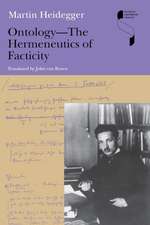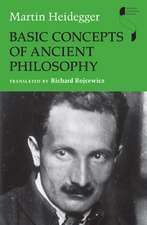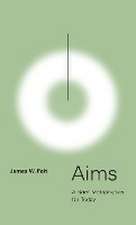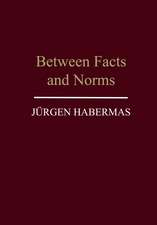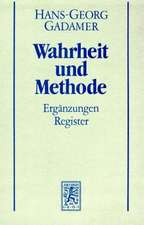The Basic Problems of Phenomenology, Revised Edition
Autor Martin Heideggeren Limba Engleză Paperback – 21 aug 1988
Librarul mai recomandă
Preț: 175.41 lei
Nou
Puncte Express: 263
Preț estimativ în valută:
33.57€ • 34.92$ • 28.13£
33.57€ • 34.92$ • 28.13£
Carte disponibilă
Livrare economică 20 februarie-06 martie
Livrare express 06-12 februarie pentru 31.48 lei
Preluare comenzi: 021 569.72.76
Specificații
ISBN-13: 9780253204783
ISBN-10: 025320478X
Pagini: 432
Dimensiuni: 156 x 234 x 23 mm
Greutate: 0.52 kg
Ediția:Revised
Editura: MH – Indiana University Press
ISBN-10: 025320478X
Pagini: 432
Dimensiuni: 156 x 234 x 23 mm
Greutate: 0.52 kg
Ediția:Revised
Editura: MH – Indiana University Press
Cuprins
Translator's Preface
Translator's Introduction
Introduction
1. Exposition and General Division of the theme
2. The concept of philosophy. Philosophy and world-view
3. Philosophy as science of being
4. The four theses about being and the basic problems of phenomenology
5. The character of ontological method. The three basic components of phenomenological method
6. Outline of the course
Part One: Critical Phenomenological Discussion of Some Traditional Theses about Being
Chapter One: Kant's Thesis: Being Is Not a Real Predicate
7. The content of the Kantian thesis
8. Phenomenological analysis of the explanation of the concept of being or of existence given by Kant
9. Demonstration of the need for a more fundamental formulation of the problem of the thesis and of a more radical foundation of this problem
Chapter Two: The Thesis of Medeval Ontology Derived from Aristotle: To the Constitution of the Being of a Being There Belong Essence and Existence
10. The Content of the thesis and its traditional discussion
11. Phenomenological clarification of the problem underlying the second thesis
12. Proof of the inadequate foundation of the traditional treatment of the problem
Chapter Three: The Thesis of Modern Ontology: The Basic Ways of Being Are the Being of Nature (res Extensa) and the Being of Mind (Res Cogitans)
13. Characterization of the ontological distinction between res extensa and res cogitans with the aid of the Kantian formulation of the problem
14. Phenomenological critique of the Kantian solution and demonstration of the need to pose the question in fundamental principle
15. The fundamental problem of the multiplicity of ways of being and of the unity of the concept of being in general
Chapter Four: The Thesis of Logic: Every Being, Regardless of Its Particular Way of Being, Can Be Addressed and Talked About by Means of the ÒIsÓ. The Being of the Copula
16. Delineation of the ontological problem of the copula with reference to some characteristic arguments in the course of the histroy of logic
17. Being as copula and the phenomenological problem of assertion
18. Assertional truth, the idea of truth in general, and its relation to the concept of being
Part Two:
The Fundamental Ontological Question of the Meaning of Being in General
The Basic Structures and Basic Ways of Being
Chapter One: The Problem of the Ontological Difference
19. Time and temporality
20. temporality [Zeitlichkeit] and Temporality [Temporalitat]
21. Temporality [Temporalitat] and being
22. Being and beings. The ontological difference
Editor's 'Epilogue
Translator's Appendix: A Note on the Da and the Dasein
Lexicon
Translator's Introduction
Introduction
1. Exposition and General Division of the theme
2. The concept of philosophy. Philosophy and world-view
3. Philosophy as science of being
4. The four theses about being and the basic problems of phenomenology
5. The character of ontological method. The three basic components of phenomenological method
6. Outline of the course
Part One: Critical Phenomenological Discussion of Some Traditional Theses about Being
Chapter One: Kant's Thesis: Being Is Not a Real Predicate
7. The content of the Kantian thesis
8. Phenomenological analysis of the explanation of the concept of being or of existence given by Kant
9. Demonstration of the need for a more fundamental formulation of the problem of the thesis and of a more radical foundation of this problem
Chapter Two: The Thesis of Medeval Ontology Derived from Aristotle: To the Constitution of the Being of a Being There Belong Essence and Existence
10. The Content of the thesis and its traditional discussion
11. Phenomenological clarification of the problem underlying the second thesis
12. Proof of the inadequate foundation of the traditional treatment of the problem
Chapter Three: The Thesis of Modern Ontology: The Basic Ways of Being Are the Being of Nature (res Extensa) and the Being of Mind (Res Cogitans)
13. Characterization of the ontological distinction between res extensa and res cogitans with the aid of the Kantian formulation of the problem
14. Phenomenological critique of the Kantian solution and demonstration of the need to pose the question in fundamental principle
15. The fundamental problem of the multiplicity of ways of being and of the unity of the concept of being in general
Chapter Four: The Thesis of Logic: Every Being, Regardless of Its Particular Way of Being, Can Be Addressed and Talked About by Means of the ÒIsÓ. The Being of the Copula
16. Delineation of the ontological problem of the copula with reference to some characteristic arguments in the course of the histroy of logic
17. Being as copula and the phenomenological problem of assertion
18. Assertional truth, the idea of truth in general, and its relation to the concept of being
Part Two:
The Fundamental Ontological Question of the Meaning of Being in General
The Basic Structures and Basic Ways of Being
Chapter One: The Problem of the Ontological Difference
19. Time and temporality
20. temporality [Zeitlichkeit] and Temporality [Temporalitat]
21. Temporality [Temporalitat] and being
22. Being and beings. The ontological difference
Editor's 'Epilogue
Translator's Appendix: A Note on the Da and the Dasein
Lexicon
Recenzii
"In Albert Hofstadter's excellent translatiion, we can listen in as Heidegger clearly and patiently explains . . . the ontological difference." - Hubert L. Dreyfus, Times Literary Supplement
"In Albert Hofstadter's excellent translatiion, we can listen in as Heidegger clearly and patiently explains ... the ontological difference." - Hubert L. Dreyfus, Times Literary Supplement
"In Albert Hofstadter's excellent translatiion, we can listen in as Heidegger clearly and patiently explains ... the ontological difference." - Hubert L. Dreyfus, Times Literary Supplement
Notă biografică
Textul de pe ultima copertă
A lecture course that Martin Heidegger gave in 1927, The Basic Problems of Phenomenology continues and extends explorations begun in Being and Time. In Basic Problems Heidegger provides the general outline of his thinking about the fundamental problems of philosophy, which he treats by means of phenomenology, and which he defines and explains as the basic problems of ontology.
Descriere
"In Albert Hofstadter's excellent translation, we can listen in as Heidegger clearly and patiently explains . . . the ontological difference." Hubert L. Dreyfus, Times Literary Supplement


